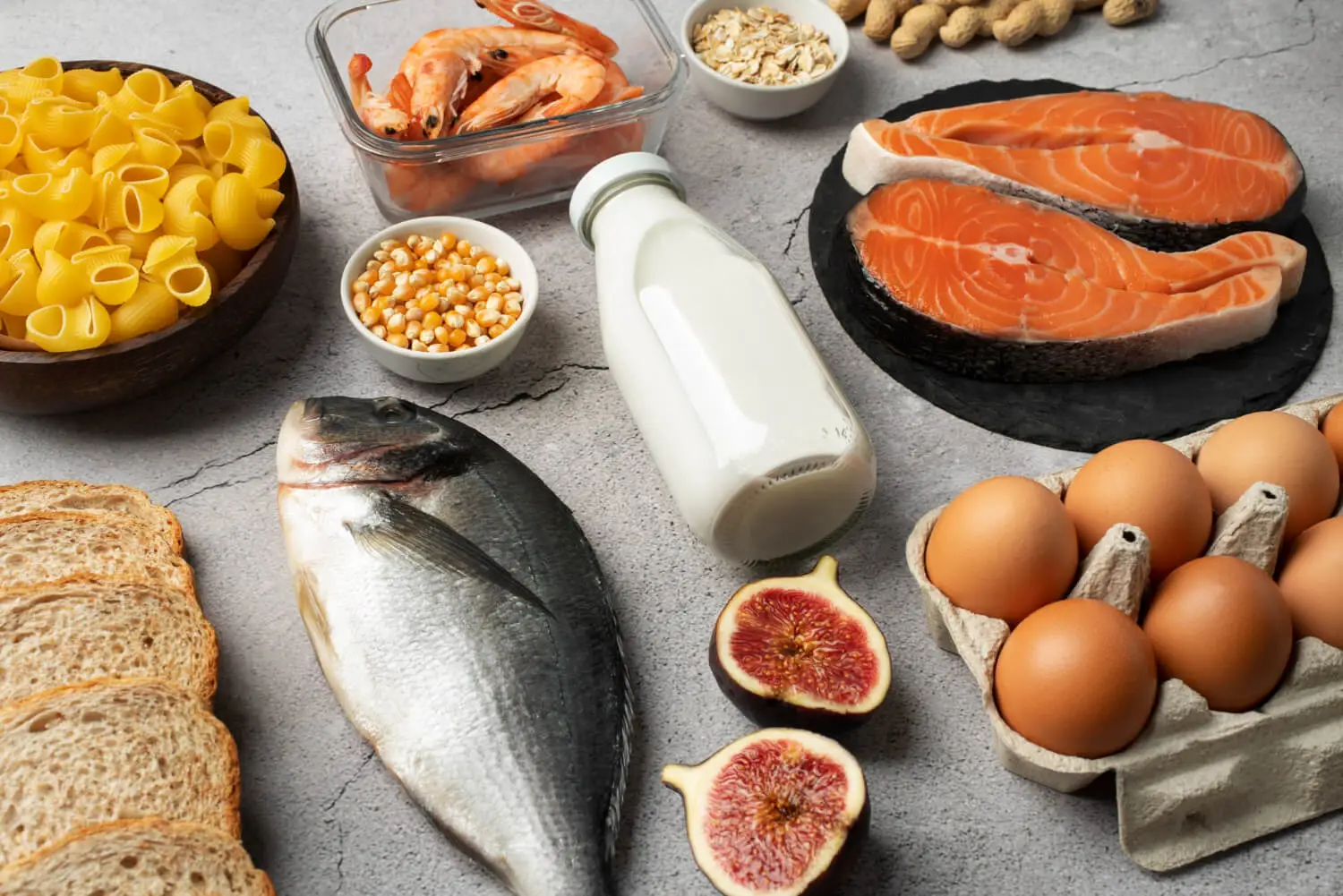Unlock Ways to Get Enough Protein Without Protein Powder

When it comes to maintaining a healthy lifestyle, we all know the essential role that protein plays. You’ve probably heard it time and time again – protein is the building block of life.
And guess what? That’s 100% true. But let’s dive a bit deeper into why protein is so essential and how it impacts our bodies.
Protein is crucial for almost every bodily function. It helps repair and build tissues, makes enzymes and hormones, and is a key player in the growth and maintenance of muscles and bones. So, yeah, protein is kind of a big deal!
You might be thinking, “Okay, I get it. Protein is important. But isn’t that what protein powders are for?” Well, not exactly.
While protein powders have become a popular go-to for many people, they aren’t the only solution – or even the best solution – to ensure you’re getting enough protein.
In fact, there are a plethora of natural sources that can provide you with your daily dose of protein. We’ll be delving into these later, but for now, let’s keep our focus on understanding protein and its significance.
There’s a common misconception that protein is only vital for those who are super into fitness or looking to bulk up their muscles.
However, this couldn’t be further from the truth. Everyone needs protein, regardless of your lifestyle or fitness goals. It’s crucial for overall health, growth, and recovery.
Now, protein powders do have their place. They’re a quick and easy solution, especially for those who struggle to meet their protein requirements through diet alone.
However, they’re not a one-size-fits-all solution. They can be pricey, some contain artificial ingredients, and honestly, nothing beats the nutritional profile of whole foods.
This blog post will serve as your comprehensive guide to understanding and getting enough protein without relying on protein powders.
Whether you’re a meat-eater, vegetarian, vegan, or flexitarian, we’ve got you covered. So, sit back, relax, and let’s dive into the wonderful world of protein!
Why Opt for Natural Sources Over Protein Powder?
Let’s tackle an important question: why should we consider natural sources of protein over protein powder?
First, it’s crucial to remember that not all protein powders are created equal. Some contain added sugars, artificial flavors, or preservatives, which might not align with your dietary preferences or health goals.
Additionally, whole foods provide a myriad of benefits beyond just protein. They come packed with a variety of essential nutrients, such as vitamins, minerals, healthy fats, and fiber, that are missing in most protein powders.
This combination of nutrients works together in harmony within our bodies, providing a more balanced approach to nutrition.
Also, getting your protein from whole foods can be much more satisfying. Imagine digging into a juicy piece of grilled chicken or enjoying a handful of crunchy almonds. That’s a sensory experience that no protein shake can match!
Animal Sources of Protein

Now that we know why natural sources are a great choice, let’s delve into the various options available. Starting with animal sources, these are some of the best high-protein foods to incorporate into your diet.
Lean Meats: Chicken, Turkey, and Lean Beef
Lean meats are a powerhouse of protein. A skinless, cooked chicken breast, for example, offers about 31 grams of protein. Plus, it’s versatile and can be used in a multitude of dishes – from salads to stir-fries, to tacos and more.
Turkey, while often overlooked, is also packed with protein. A cooked turkey breast has around 29 grams of protein. It’s not just for Thanksgiving anymore!
And let’s not forget about lean beef. A 3-ounce serving of lean beef can provide about 22 grams of protein, making it an excellent choice for a protein-rich meal.
Fish and Shellfish: Salmon, Tuna, and Shrimp
When it comes to seafood, both fish and shellfish are fantastic protein sources. A cooked salmon fillet, for instance, contains roughly 22 grams of protein. And it doesn’t stop there; salmon is also packed with healthy omega-3 fatty acids.
Tuna, either fresh or canned, is another excellent choice. A cup of canned tuna can offer an impressive 39 grams of protein!
Lastly, we have shrimp, a lean source of protein. A 3-ounce serving of cooked shrimp delivers around 18 grams of protein, and it’s low in calories too.
Eggs: A Versatile Protein Source
Eggs deserve a special mention. They’re an inexpensive, versatile source of high-quality protein. One large egg contains around 6 grams of protein and is also rich in vitamins and minerals.
Dairy Products: Milk, Cheese, and Yogurt
Dairy products are not only rich in protein but also come packed with calcium and other essential nutrients.
A cup of milk provides about 8 grams of protein, while a single slice of cheese can have up to 7 grams. And let’s not forget yogurt; a cup of Greek yogurt can deliver a whopping 20 grams of protein!
Remember, variety is the spice of life. The beauty of these natural sources of protein lies in their versatility. You can mix and match, experimenting with different foods and recipes to meet your protein needs.
Read Also: Proactive Measures: A Guide to Preventing Chronic Diseases
Plant-Based Protein Sources

Moving on from animal sources, let’s now explore the world of plant-based protein. Whether you’re vegetarian, vegan, or simply trying to cut down on your meat intake, these sources of protein are fantastic alternatives.
Legumes: Lentils, Chickpeas, and Black Beans
Legumes are a protein-rich favorite in many plant-based diets. Lentils, for instance, pack around 18 grams of protein per cooked cup. They’re also a great source of dietary fiber.
Chickpeas, also known as garbanzo beans, offer about 15 grams of protein per cooked cup. Plus, they’re incredibly versatile – think hummus, falafel, or simply roasted as a crunchy snack.
Black beans are another protein-packed legume. A cup of cooked black beans can provide around 15 grams of protein.
Nuts and Seeds: Almonds, Sunflower Seeds, and Chia Seeds
Nuts and seeds are not only protein-rich but also packed with healthy fats. Almonds, for example, provide around 6 grams of protein per ounce. Sunflower seeds, too, offer a good amount of protein – about 5.5 grams per ounce.
Chia seeds are another protein-packed choice. These tiny seeds offer around 5 grams of protein per ounce, and they’re also loaded with fiber and omega-3 fatty acids.
Whole Grains: Quinoa, Brown Rice, and Oats
Whole grains are more than just a source of carbohydrates. Quinoa, for instance, is a complete protein – it provides all nine essential amino acids your body needs. One cooked cup offers about 8 grams of protein.
Brown rice and oats are other excellent sources of plant-based protein. A cup of cooked brown rice provides around 5 grams of protein, while a cup of cooked oats has about 6 grams.
Vegetables: Spinach, Broccoli, and Peas
Yes, even your greens can offer protein! A cup of cooked spinach packs about 5 grams of protein, while the same amount of cooked broccoli offers approximately 4 grams.
Peas are a surprisingly good source of protein too. One cooked cup of green peas provides around 8 grams of protein.
Soy Products: Tofu, Tempeh, and Edamame
Soy-based products are a cornerstone of plant-based protein. Tofu, for example, can offer around 10 grams of protein per half-cup. Tempeh is even more protein-dense, with about 15 grams per half-cup.
Edamame, or young green soybeans, are also protein-rich. A cooked cup can provide a hefty 17 grams of protein.
Read Also: Addressing Common Nutrient Deficiencies: A Path to Optimal Health
How to Incorporate More Protein Into Your Meals

Now that we’ve identified a plethora of protein sources, how do we incorporate them into our meals effectively? Here are a few ideas:
Breakfast
Kick-start your day with protein-rich foods. Opt for a bowl of oats topped with nuts and seeds, or scrambled eggs with spinach and cheese. If you’re in a hurry, a Greek yogurt with some fruit can be a great on-the-go option.
Lunch
For lunch, consider a hearty salad with grilled chicken or chickpeas. A quinoa salad with mixed vegetables can also pack a protein punch. Sandwiches with lean meats, cheese, or even tofu are another excellent choice.
Dinner
When dinner time rolls around, the possibilities are endless. Grilled salmon or shrimp, stir-fried tofu, or a hearty lentil stew are all protein-rich choices. Don’t forget to pair your protein with some whole grains or veggies for a balanced meal.
Snacks
When it comes to snacks, almonds or sunflower seeds can be a handy choice. Greek yogurt, cottage cheese, or a homemade hummus with carrot sticks are other protein-packed options.
These are just a few ways to incorporate more protein into your meals. With a bit of creativity and planning, meeting your protein needs without protein powder is not only doable but can also be delicious and enjoyable.
Read Also: Top Essential Vitamins and Minerals for Pregnancy You Must Know
Special Considerations for Plant-Based Diets
While plant-based diets are healthful and packed with nutrients, there are some special considerations when it comes to protein intake. Let’s shed some light on these.
Combining Protein Sources
One key point to remember is that not all plant proteins are ‘complete,’ meaning they don’t have all nine essential amino acids your body needs.
But don’t worry! By consuming a variety of plant-based proteins throughout the day, you can easily get all these essential amino acids.
Think of it like a jigsaw puzzle, each plant protein has different pieces, and when you combine them throughout the day, you complete the picture!
Nutrient Absorption
Another point to consider is nutrient absorption. Some plant foods contain anti-nutrients, substances that can reduce your body’s ability to absorb certain nutrients.
Soaking, sprouting, or cooking these foods can significantly reduce these anti-nutrients and improve nutrient absorption.
Myths and Misconceptions About Protein Intake

Now that we’ve covered the basics of getting enough protein without protein powder, let’s dispel some common myths and misconceptions about protein intake.
Myth 1: You Can Only Get Enough Protein from Meat
While meat is an excellent source of protein, it’s not the only one. As we’ve seen, there are plenty of plant-based proteins and dairy products that can help you meet your protein needs.
Myth 2: More Protein is Always Better
Just like any nutrient, balance is key. While protein is essential, consuming excessive amounts won’t necessarily lead to more muscle or better health.
In fact, consuming too much protein can put a strain on your kidneys and lead to nutritional imbalances.
Myth 3: All Protein Sources Are Equal
Protein quality matters. Some proteins are more ‘bioavailable,’ meaning your body can use them more effectively.
Animal proteins are generally more bioavailable than plant proteins, but remember, you can still meet your protein needs with a plant-based diet by consuming a variety of protein sources.
Remember, it’s essential to listen to your body and adjust your protein intake according to your individual needs and lifestyle.
Read Also: Unlocking a Healthy Pregnancy: Essential Tips for Nutritious Eating
Read Also: How to Improve Your Gut Health After Antibiotics
Conclusion
As we come to the end of our exploration into getting enough protein without protein powder, we hope this comprehensive guide has shed light on the many protein-rich foods that nature offers us. From lean meats to legumes, from eggs to edamame, the options are abundant and diverse.
The key takeaway is that balance and variety are critical to a healthy diet. Consuming a wide range of foods not only ensures you get enough protein, but it also provides other essential nutrients your body needs to function optimally.
Remember, protein powders can be a convenient way to boost your protein intake, especially for athletes or those with higher protein needs.
However, they should never replace balanced, whole-food meals. After all, no single food or supplement can match the array of nutrients found in whole foods.
And while meeting your protein needs is important, it’s only one piece of the nutritional puzzle. A balanced diet should also include plenty of fruits, vegetables, whole grains, and healthy fats.
Finally, it’s always a good idea to consult with a registered dietitian or nutrition professional to personalize your dietary approach, especially if you have specific health conditions or dietary preferences.
Thank you for embarking on this journey with us. Here’s to embracing a balanced, protein-rich diet that fuels your body and nourishes your soul!
FAQs
Can I get enough protein without using protein powder?
Yes, you certainly can. There are numerous natural food sources, both animal-based like chicken, fish, eggs, and dairy, and plant-based like lentils, chickpeas, and quinoa, that can provide sufficient protein.
Are plant-based proteins complete proteins?
Not all plant-based proteins are ‘complete’, meaning they don’t have all nine essential amino acids. However, by consuming a variety of plant-based proteins throughout the day, you can get all the essential amino acids your body needs.
How can I incorporate more protein into my meals?
There are many ways to add more protein to your meals. This can include adding legumes to your salads, using Greek yogurt in your smoothies, or having a handful of nuts as a snack. You can also replace refined grains with whole grains that are higher in protein.
Are there any myths about protein intake that I should be aware of?
Yes, some common myths include the idea that you can only get enough protein from meat, more protein is always better, and all protein sources are equal. These are not true, and a balanced, varied diet can ensure you get adequate protein.
Can overconsumption of protein lead to health issues?
Yes, while protein is essential for health, consuming excessive amounts can put a strain on your kidneys and lead to nutritional imbalances. It’s always best to aim for a balanced diet.
How do I know if I’m getting enough protein?
Symptoms of protein deficiency can include fatigue, weakness, and frequent hunger. If you’re concerned about your protein intake, it’s best to consult with a healthcare provider or a registered dietitian.




